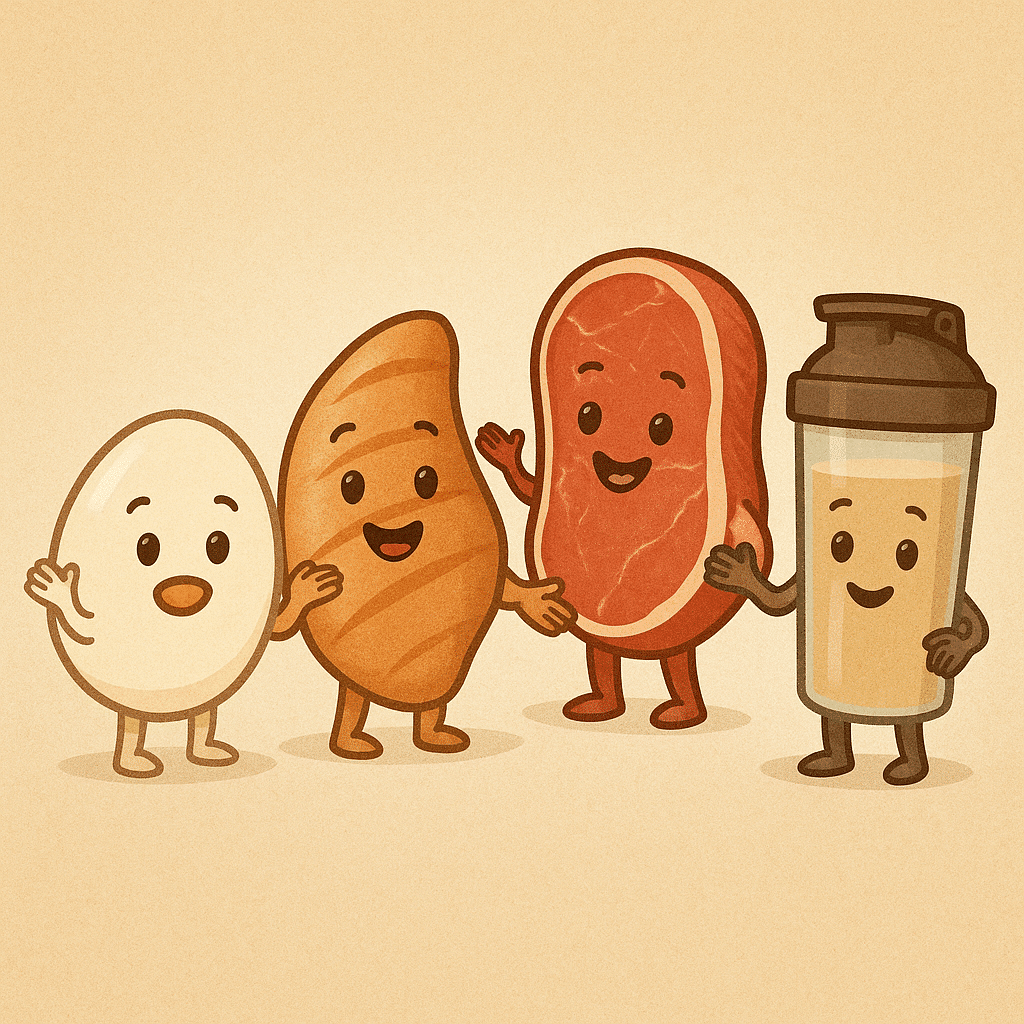Body Protein Requirement Calculator
Pelank Life ©
Protein is a key component of nutrition essential for maintaining a healthy body. It is made up of amino acids and plays a vital role in building and repairing body tissues, producing enzymes, hormones, and important cellular components. The amount of protein needed varies based on factors such as age, weight, physical activity, and health status. Consuming adequate protein from diverse sources like meat, fish, poultry, dairy, and plant-based products supports overall health and bodily functions.
Pelank © Beta Version of the Daily Protein Calculator
محاسبه پروتئین مورد نیاز روزانه
نتیجه محاسبه پروتئین روزانه شما
| حداقل پروتئین مصرفی | |
|---|---|
| حداکثر پروتئین مصرفی | |
| مقدار به ازای هر کیلوگرم | |
| تقسیم بین وعدهها | |
| درصد پروتئین از کل کالری | |
| مقایسه با RDA (کمینه بزرگسالان) | ۰.۸ گرم/کیلوگرم (Institute of Medicine, 2005) |
| توضیح علمی نیاز شما | |
| مبنای علمی |
Pelank Life | Body Health Assessment
The Best Body Health Calculators Using Scientific Methods
Developed by Pelank Life ©
What is the Body’s Protein Requirement?
Protein : The Foundation of Health and Body Performance Enhancement
Protein is a fundamental component of nutrition that plays a vital role in the structure and function of the human body. This article explores the importance of protein for physical and mental health, how it functions within the body, the required amounts, and rich dietary sources of protein.
The Importance of Protein :
Proteins play a crucial role in the body’s fundamental structures; muscles, skin, hair, enzymes, hormones, and cellular components are all primarily made up of protein. Additionally, protein is essential for oxygen and nutrient transport, strengthening the immune system, and repairing and maintaining body tissues.
How Protein Works :
Proteins are made up of chains of amino acids and play a crucial role in maintaining the body’s acid-base balance. Each amino acid, based on its unique structure and properties, can participate in various bodily functions.

Recommended Protein Intake for the Body
The body’s protein requirements vary based on factors such as age, gender, physical condition, and level of physical activity. Active individuals and athletes need higher amounts of protein to strengthen muscles and accelerate recovery after exercise.
Dietary Sources of Protein :
Protein-rich foods come from animal sources such as meat, fish, eggs, and dairy, as well as plant sources like legumes, seeds, and soy. A diverse protein intake helps improve amino acid balance and provides all essential components required by the body.
Chicken:
- Protein content in 100 grams of cooked chicken: approximately 32 grams.
Fish:
- Protein content in 100 grams of cold-water fish: approximately 25 grams.
Egg:
- Protein content in 100 grams of egg: approximately 13 grams.
Protein-containing butters:
- Protein content in 100 grams of peanut butter: approximately 25 grams.
Dairy products:
- Protein content in 100 grams of cheddar cheese: approximately 25 grams.
Legumes:
- Protein content in 100 grams of pinto beans: approximately 21 grams.
Nuts and seeds:
- Protein content in 100 grams of brown rice: approximately 7 grams.
Cabbage and vegetables:
- Protein content in 100 grams of cabbage: approximately 2.5 grams.
Canned tuna:
- Protein content in 100 grams of canned tuna: approximately 30 grams.
Beef:
- Protein content in 100 grams of beef: approximately 26 grams.
Please note that the protein content in each food item may vary and can change depending on cooking methods and food preparation.

Effects of protein deficiency or excess
Protein deficiency can lead to muscle weakness, impaired immunity, and reduced healing capacity. On the other hand, excessive protein intake may cause kidney problems, digestive disorders, and weight gain.
Protein requirements for athletes: Adequate protein intake is essential for athletes, as these molecules play a crucial role in muscle repair and growth.
Bodybuilder characteristics: Bodybuilders require higher amounts of protein to strengthen their muscles and achieve an ideal body composition.
Protein and weight maintenance in women: For women, protein enhances satiety signals and can be effective in weight control and hunger prevention.
Balance in protein intake: Maintaining a balanced protein consumption is essential for athletes and bodybuilders to optimally nourish and rebuild muscles.
Food sources for women: Women can obtain their protein needs from sources such as fish, eggs, low-fat dairy products, and legumes.
Protein and body recovery: Protein consumption during the recovery phase after workouts is vital for athletes and bodybuilders.
Prevention of muscle injuries: Adequate protein intake can help athletes reduce muscle damage and accelerate recovery.
Protein and endurance improvement: To enhance endurance in endurance sports, women need to regularly consume adequate protein to supply the necessary energy.
Impact of protein in weight loss diets: In weight loss diets for bodybuilders and athletes, protein intake can prevent muscle loss, ensuring that only excess fat is reduced.
Protein as an energy fuel: Protein can serve as a source of energy fuel for athletes, providing the necessary energy for workouts. Overall, consuming an adequate amount of protein according to the needs of athletes and bodybuilders is essential for improving performance and maintaining overall health.

Conclusion :
Protein requirements are a fundamental and vital element of human nutrition, essential for maintaining health and enhancing bodily performance. Determining the appropriate protein intake—by adjusting food types and diversifying its sources—can help individuals fully benefit from this nutritional component and strengthen their overall health.
Exercise with Pelank
-
برنامه تمرینی آنلاین 1,300,000 تومان – 15,600,000 تومانPrice range: 1,300,000 تومان through 15,600,000 تومان
-
مربی آنلاین
Rated 5.00 out of 55,000,000 تومان – 7,500,000 تومانPrice range: 5,000,000 تومان through 7,500,000 تومان -
مربی ورزشی خانواده
Rated 5.00 out of 515,000,000 تومان


